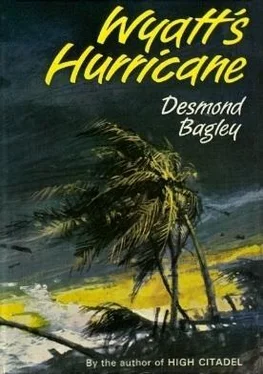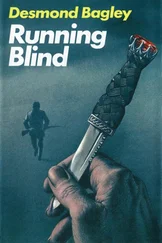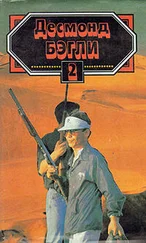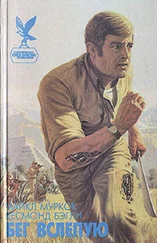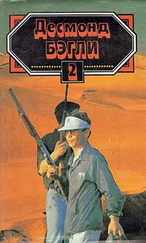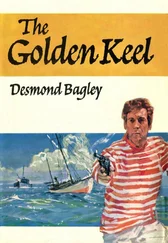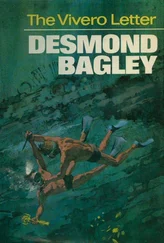Smeared with viscous mud, he lay in a water-filled hole with the wind and the rain lashing him cruelly and was very content.
The hurricane achieved its greatest strength just after midnight. The very noise itself was a fearsome thing, a malignant terrifying howl of raw power that seared the mind. The rain had slackened and there were no large drops, just an atomized mist driving level with the ground at over a hundred miles an hour, and, as Wyatt had predicted, the flooding ground water had been lifted in the wind’s rage.
Lightning now flashed continuously, illuminating the ridge in a blue glare, and once, when Wyatt lifted his eyes, he saw the dim outlines of the mountains, the Massif des Saints. They would resist the terrible wind; standing there rooted deep in the bowels of the earth they were a match for the hurricane which would batter its life away against them. Perhaps this slight barrier would take the vicious edge off Mabel and she would go on her way across the Caribbean only to die of the mortal wound she had received. Perhaps. But that would not help the agony of San Fernandez.
Again in a lightning flash he saw something huge and flat skim overhead like a spinning playing card. It struck the ground not five yards away from the foxhole and then took off again in sharply upward flight. He did not know what it was.
They lay in their hole, hugging to the thick, viscous mud at the bottom, deafened by the maniacal shriek of the storm, sodden to the skin and becoming colder as the wind evaporated the moisture from their clothing, and with their minds shattered by the intensity of the forces playing about them. Once Causton inadvertently lifted his arm above ground level and the wind caught his elbow and threw his arm forward with such power that he thought it was broken, and if the arm had been thrown against the shoulder joint instead of with it, it very well might have been.
Even Wyatt, who had a greater understanding of what was happening than the others, was astonished at this violence. Hitherto, when he had flown into the depths of hurricanes, he had felt a certain internal pride, not at his own bravery but at the intrepidity and technical expertise of mankind who could devise means of riding the whirlwind. But to encounter a hurricane without even the thin Duralumin walls of an aircraft to enfold a shrinking and vulnerable body was something else again. This was the first hurricane he had experienced from the ground and he would be a better meteorologist for it — if he lived through it, which he doubted.
Gradually they fell into a stupor. The brain — the mind — can only take so much battering and then it automatically raises its defences. Over the hours the incredible noise became so much a part of their environment that they ceased to hear it, their tensed bodies relaxed when the adrenalin stopped being pumped into the bloodstream and, beaten into tiredness, they fell into an uneasy doze, their limbs flaccid and sprawled in the mud.
At three in the morning the wind began to ease slightly and Wyatt, his expert ear attuned to the noise even in his unquiet inertness, noticed the change immediately. The rain had stopped completely and there was only the cruel wind left to hurt them, and even the wind was pausing and hesitating, sometimes gusting a little harder as though regretting a slight check, yet always dying a little more.
At four o’clock he stirred and looked at his watch, rubbing away the slimy mud from the dial so that he could see the luminous figures. It was still pitch dark and there was less lightning, but now he could hear the thunder rolling among the clouds, which meant the wind was not as intense. He stirred his limbs and tentatively thrust his hand above ground-level. The wind pushed hard at it but not so much that he could not resist and he concluded that the wind-strength was now just back on the Beaufort Scale — a nice, comfortable storm.
Once roused, his mind was active again. He had an intense curiosity about what was happening on the other side of the ridge, and the itch to know got the better of him. He tested the strength of the wind again and thought it was not too bad, so he turned over and eased himself out of the foxhole on his belly and began to crawl up the slope. The wind plucked at him as he inched his way through the mud and it was worse than he thought it would be. There was a great difference between sitting in a hole and being caught in the open, and he knew that but for the foxhole they would not have survived. However, driven by the need to know, he persevered and, although it took him fifteen minutes to traverse the twenty yards to the top of the ridge, he made it safely and tumbled into water two feet deep in a foxhole that had been dug to protect against a storm of steel rather than a storm of air.
He rested for a few minutes in this shelter, glad to be out of the worst of the wind, then lifted his head and peered into the darkness, his hands cupped blinkerwise about his eyes. At first he saw nothing, but in a momentary lull before a gust he heard something that sounded very much like the sea and the splash of waves. He blinked and stared again and, in the glare of a lightning flash, he saw a terrifying sight.
Not more than two hundred yards away was a storm-driven sea with short and ugly waves, the tops sheered off by the fierce wind to blow horizontally across the waste of water. An eddy of wind blew spray into his face and he licked his lips and tasted salt water.
St Pierre had been totally engulfed.
As the first grey light of dawn touched the sky Julie eased her cramped legs. She had tucked them under her body in an attempt to keep them reasonably dry and she had failed, but at least they were not lying under a running torrent of water. The wind had dropped with the coming of day; no longer did it howl ferociously nor did it fling cascades of water at them, but still the water ran in a muddied flood down the ravine.
It had been a bad night. In their little cave under the great rock they were well protected from the wind; it had roared about them but they were untouched by it. The water was something else. It came from above, slowly at first, and then in an increasing rush, pouring over the rock that protected them in a dirty brown waterfall which splashed with increasing violence at their feet, and carried with it the tree-fallen detritus which littered the ravine above.
As the wind grew in strength the wall of water before their faces was torn and shredded, blowing away in a fine spray across the hillside, and when the wind backed and eddied they were deluged as though someone had thrown a bathful of water into the cave. This happened a dozen times an hour with monotonous regularity.
Their shelter was cramped, small — and safe. The walls of the ravine rose sheer on each side and the wind, tearing over the open hillside, sometimes actually sucked the air out of this cleft at the height of the storm and left them gasping for breath for the space of a couple of heart-beats. But this did them no harm and indeed helped, because the water also went with the air, giving them momentary respite.
They could either sit with their legs outstretched and have the waterfall pouring over their feet and the danger of bruises or worse as the flood swept down tree branches and stones, or they could sit on them and get cramp. They alternated between these methods, extending their legs when the cramp became too bad. The water was not too cold, for which Julie was thankful, and she thought hysterically that she was being washed so clean that she would never need to take another shower ever again. The very thought of the hissing spray of water in her bathroom at home made her feel physically sick.
At first they could talk quite comfortably. Rawsthorne was feeling better for the rum. He said, ‘We might get a bit wet here, but I think we’ll be safe with this rock behind us.’
Читать дальше
